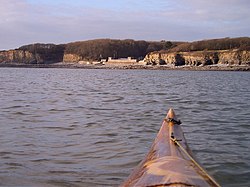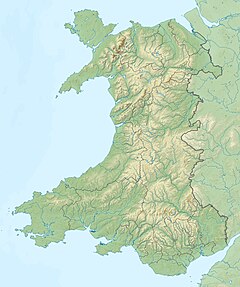|
Atlantic College Lifeboat Station
Atlantic College Lifeboat Station was an Inshore lifeboat station based at Atlantic College, which is located on the Bristol Channel coast of South Wales, at St Donats, near Llantwit Major. The station opened in 1963, shortly after the school had been launched the previous autumn, as one of the first nine experimental inshore lifeboat stations established by the Royal National Lifeboat Institution (RNLI).[1][2] The station pioneered innovative boatbuilding techniques, including inventing the Rigid Inflatable Boat (RIB) and creating the prototype for the Atlantic 21-class lifeboat in the early 1970s. The RNLI withdrew the lifeboat from Atlantic College in June 2013. HistoryB-class developmentAtlantic College was instrumental in the design and development of the RNLI's first fast rescue boats under the supervision of the founding headmaster, Rear Admiral Desmond Hoare. He was the pioneer of the revolutionary Rigid Inflatable Boat (RIB) and of the prototype for the eventual B-class (Atlantic 21) lifeboat, which was named after the college and entered service in the early 1970s. In the early 1960s the college began designing, building and experimenting with the operation of a series of rigid inflatable boat, one of which eventually became the basis for the B-class. The chief innovation was the design, construction and testing of a rigid hull attached to inflatable tubes, for previously the inflatable boat bottoms were made of flexible, rubberized fabric that was kept taught under load through the use of collapsible inboard floorboards that formed the boat’s deck. This notable and novel innovation was in response to the rough seas, breaking surf and rocky shore conditions at the college’s St Donats Bay seafront access, in which school rescue craft had to be launched, operated and recovered. The college sold the RIB patent to the RNLI for £1 in 1973.[3][4] An early example was discovered in Barry in 2012 and restored in 2014.[5] First female crewmemberOn 20 May 1971, the station recorded the first service at any station involving a female crew member taking part. Penelope M. Sutton was a member of the crew when the ILB was launched to investigate a Swedish motor cruiser, reported to be at anchor and flying a distress signal. The incident was a false alarm, as the courtesy Red Ensign flown on the cruiser had been misinterpreted. RNLI lifeboat station In 1973, the station received its first standardized RNLI Atlantic 21 lifeboat. Previous lifeboats operated by the station were owned by the college with the RNLI paying for the operating expenses. In 2000, the station received a slightly longer and larger Atlantic 75-class lifeboat at roughly 24 feet in length. The RNLI withdrew their standardized lifeboat in June 2013.[6] Helmsman training time had increased from one to two years, so it became no longer practical to train students as helms during the two year College (International Baccalaureate Diploma) program (two years of study). Heritage Continues The college continues to be involved in boatbuilding, and in the mid-2010s a program of small RHIB powerboat building and operator training was introduced for students. In 2015, Atlantic College joined a number of other organisations to campaign for the establishment of a lifeboat service in Japan, coordinated by college alumnus and current RNLI crew member Robin Jenkins.[4] Innovation continues with the introduction of a 4.3 metre RHIB powered by a 40 hp / 30 kw outboard engine with propeller guard that can fit into a standard shipping container for shipment over to Kamaishi in north eastern Japan, where the container serves as a mobile lifeboat station (equipped with crew change area, tools and maintenance mini-bay and boat storage on a launching dolly.) Atlantic Pacific International Rescue Boats, a non-governmental organization, works with Atlantic College students to build these Hahn class rigid hull inflatable boats for humanitarian relief purposes.[7][8] An example is a rescue boat that was transported to Lesvos Greece under the logistical efforts of AC alumnus Richard Chamberlain, for ongoing use in supporting the migrant refugee crisis by volunteers. Soon another craft and mobile station will end up in north eastern Africa. Station honoursThe following are awards made at Atlantic College
Atlantic College lifeboats
See alsoReferences
External links |
||||||||||||||||||||||||||||||||||||||||||||||||||||||||||||||||||||


